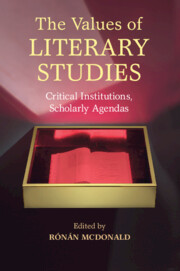Book contents
- Frontmatter
- Contents
- Notes on Contributors
- Acknowledgments
- Introduction
- 1 The Value of Criticism and the Project of Modernism
- 2 Caprice: Individual Subjectivity in Literary Criticism
- 3 The Phenomenology of Literary Valuation
- 4 Literature Is History: Aesthetic Time and the Ethics of Literary Will
- 5 Dead on Arrival: Time and the Value of Old Books
- 6 The Price of Value
- 7 To Shelter the Nothing That Happens
- 8 When Literary Criticism Mattered
- 9 Literature among the Objects of Modernist Criticism: Value, Medium, Genre
- 10 “Vale!” : Psychoanalysis, Value, and Literature
- 11 Afterlives of Comparison: Literature, Equivalence, Value
- 12 Feminism, Gender, and the Literary Commons
- 13 The Value of World Making in Global Literary Studies
- 14 Multiple Versions and Fictional Minds: Manuscript Research, Digital Editing, and Enactive Cognition in Literary Studies
- 15 After Suspicion: Surface, Method, Value
- 16 Literary Experience and the Value of Criticism
- Index
10 - “Vale!” : Psychoanalysis, Value, and Literature
Published online by Cambridge University Press: 05 November 2015
- Frontmatter
- Contents
- Notes on Contributors
- Acknowledgments
- Introduction
- 1 The Value of Criticism and the Project of Modernism
- 2 Caprice: Individual Subjectivity in Literary Criticism
- 3 The Phenomenology of Literary Valuation
- 4 Literature Is History: Aesthetic Time and the Ethics of Literary Will
- 5 Dead on Arrival: Time and the Value of Old Books
- 6 The Price of Value
- 7 To Shelter the Nothing That Happens
- 8 When Literary Criticism Mattered
- 9 Literature among the Objects of Modernist Criticism: Value, Medium, Genre
- 10 “Vale!” : Psychoanalysis, Value, and Literature
- 11 Afterlives of Comparison: Literature, Equivalence, Value
- 12 Feminism, Gender, and the Literary Commons
- 13 The Value of World Making in Global Literary Studies
- 14 Multiple Versions and Fictional Minds: Manuscript Research, Digital Editing, and Enactive Cognition in Literary Studies
- 15 After Suspicion: Surface, Method, Value
- 16 Literary Experience and the Value of Criticism
- Index
Summary
I will begin with a vignette culled from Jacques Lacan's clinical practice memorialized by Jean Allouch. There was an analysand, a committed Lacanian who, because of his fervor as a member of the school, decided to start training in a psychiatric hospital. He believed that he needed a diploma, the official certification granted to physicians or psychiatrists. At the start of the academic year, he told Lacan that he had registered at the medical school. Lacan's immediate response was to double his fee. The result was that the patient was unable to continue his medical studies.
The meaning of the story cannot be limited to a testimony of Lacan's notorious greed; it allegorizes the complex links between money, time, and power that determine agency in the psychoanalytical cure. In this case, the doubling of the fee functions as an active interpretation. Lacan, who disagreed with the idea of medical training, found a simple and effective way of forcing the analysand to make a choice: either he continued with Lacan or left him to go to medical school. Here, the two meanings of “value,” the adequate monetary price and an ethical assessment based on general principles, are joined by the pragmatics of the talking cure's contractual framework. Having decided to stay in analysis, the would-be medical student will have to get a second job to pay for his sessions with Lacan; he will understand the hard way that psychoanalysis has nothing to do with a medical training. In the end, he will spend more money, even lose money, but this will be in order to gain an invaluable if bitter knowledge about the limits of official recognition and the ethical need for self-authorization.
The anecdote allows one to verify the validity of the Lacanian motto popularized by Slavoj Zizek: psychoanalysis offers itself as the symptom of capitalism. In psychoanalysis, one pays to work – but one works first to gain strength by undoing the alienation (real and psychic) generated by the conditions imposed by capitalist economy, and then by finding ways of reading the symptom in oneself, or better said, the symptom that one is. Thus the symptom shifts from being imposed by exterior forces to an expression of identity, an expression that once read will be understood to condense a given subject's most precious singularity.
- Type
- Chapter
- Information
- The Values of Literary StudiesCritical Institutions, Scholarly Agendas, pp. 155 - 171Publisher: Cambridge University PressPrint publication year: 2015
- 1
- Cited by

